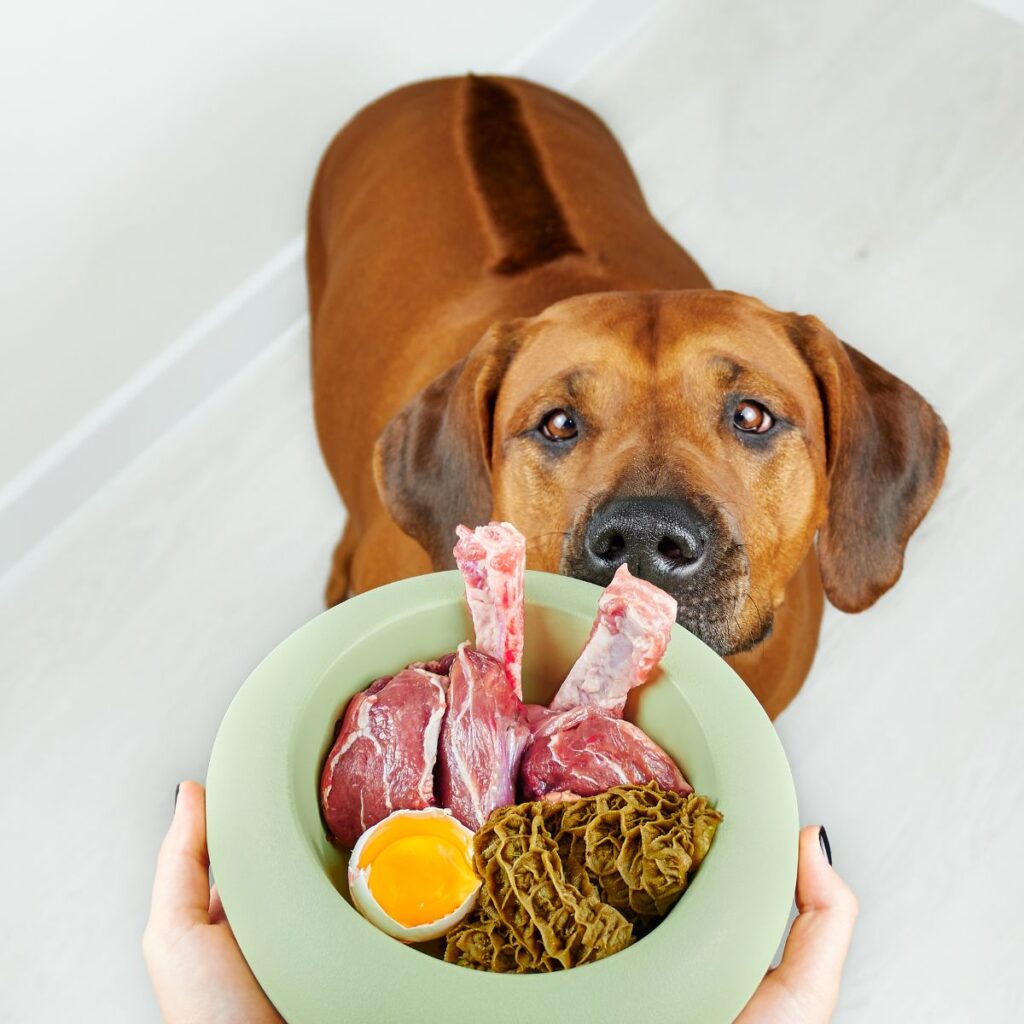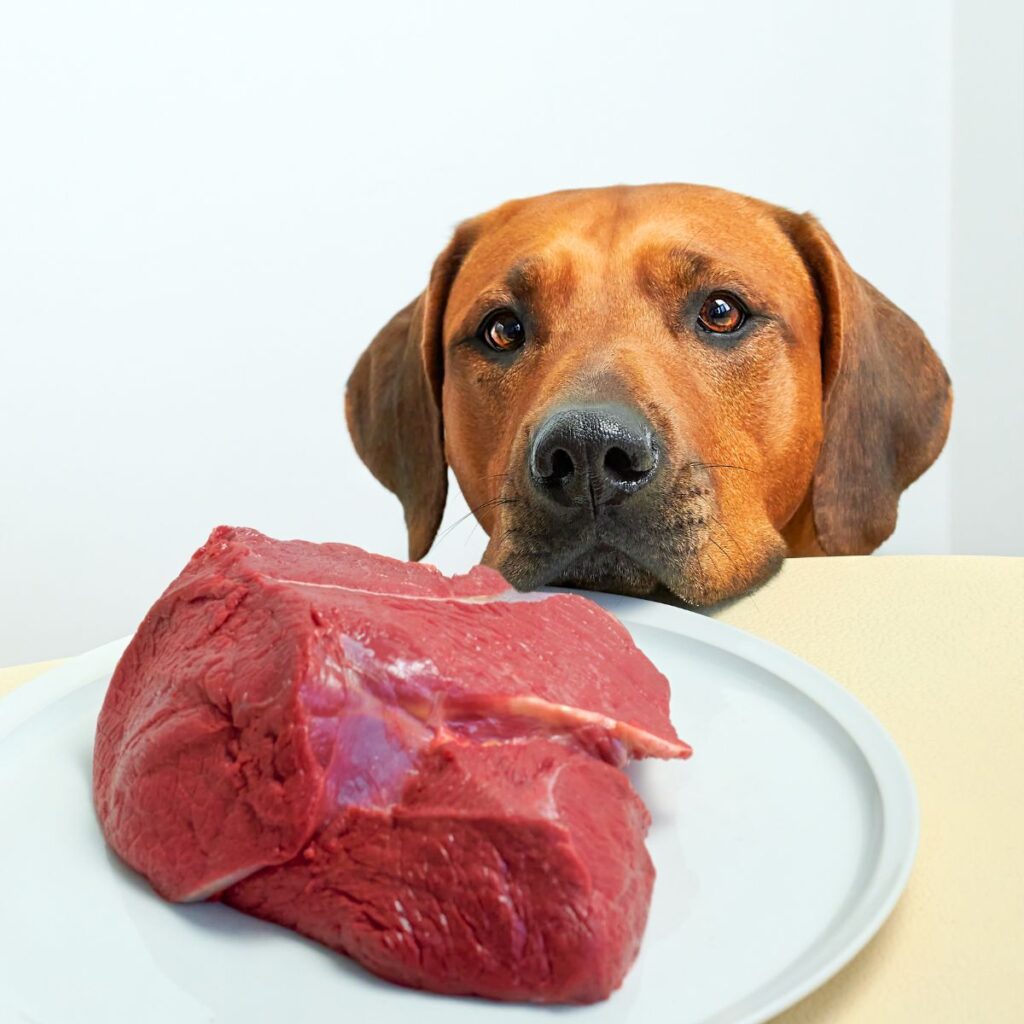When caring for our dogs, some people wonder if it’s okay to give them meat tenderizer. It’s a common question, and checking if it’s safe before trying it out is essential.
This blog post will examine whether it’s a good idea to include meat tenderizer in a dog’s diet.
We’ll explore what’s in meat tenderizer and how it might affect our furry friends. Ensuring we understand the potential risks is crucial to making the best choices for our beloved pets.
What Is a Meat Tenderizer?
A meat tenderizer is a culinary tool or ingredient designed to make meat more tender and easier to chew.
This kitchen aid breaks down the tough fibers in meat, enhancing its texture and overall palatability.
In its physical tool form, a meat tenderizer typically consists of a spiked surface or a series of blades pressed into the meat, mechanically disrupting its muscle fibers.
On the other hand, in a culinary ingredient form, meat tenderizers often contain enzymes like papain (derived from papayas) or bromelain (found in pineapples), which work to tenderize meat proteins naturally.
The application of a meat tenderizer is a common practice in cooking, particularly for tougher cuts of meat, aiming to improve the dish’s final taste and eating experience.
Is Meat Tenderizer Healthy for Dogs?

There may be better ideas than using meat tenderizer for dogs. Meat tenderizers have enzymes like papain and bromelain, which are okay for people but might not be suitable for dogs.
Dogs have different digestive systems, and introducing these enzymes may cause problems.
Meat tenderizers often contain enzymes like papain and bromelain, derived from papayas and pineapples.
While these enzymes are generally safe for human consumption and aid in breaking down tough meat fibers, their application in a canine diet requires careful consideration due to the distinct digestive physiology of dogs.
Dogs are primarily carnivores, and their digestive systems are adapted to process a diet rich in animal proteins.
Introducing foreign enzymes, such as those found in meat tenderizers, may disrupt the natural balance of their digestive processes.
The enzymes in meat tenderizers target proteins in meat, potentially affecting the breakdown and absorption of nutrients in a dog’s digestive system.
Furthermore, commercial meat tenderizers may contain additives, preservatives, or other safe components for humans but could be harmful to dogs.
Some dogs may have sensitivities or allergies to certain ingredients present in these products.
Before incorporating meat tenderizer into a dog’s diet, it is crucial to consult with a veterinarian. Vets can provide:
- Personalized advice based on the specific health needs and characteristics of the dog.
- Taking into account factors such as age.
- Any existing health conditions.
In summary, while meat tenderizers may be a helpful kitchen tool for humans, their use in a canine diet should be approached with caution.
Seeking professional guidance from a veterinarian ensures that any dietary modifications align with the nutritional requirements of dogs and promote their overall health and happiness.
What Meat Tenderizers Are Safe for Dogs?

When considering meat tenderizers for dogs, it’s essential to prioritize their safety and well-being.
However, it’s important to note that traditional meat tenderizers designed for human consumption may not suit dogs due to their unique digestive systems.
If you’re looking to tenderize your dog’s meat for any reason, opting for natural methods is safer.
One such way is using yogurt or buttermilk as a marinade. These dairy products contain lactic acid, which can help tenderize the meat without introducing potentially harmful enzymes.
Additionally, incorporating cooked vegetables like sweet potatoes or pumpkin into your dog’s meals can add moisture and tenderness to their food.
These vegetables are safe for dogs and contribute essential nutrients to their diet.
Always consult a veterinarian before making significant changes to your dog’s diet.
They can provide personalized advice based on your dog’s specific needs and ensure that any food additions are safe and beneficial.
Remember, prioritizing your dog’s health and consulting with a professional is critical when exploring dietary adjustments.
What Should I Do If My Dog Eats Meat Tenderizer
If your dog has ingested meat tenderizer, it’s essential to act promptly to ensure their safety.
Contact your veterinarian immediately and provide details about the type and amount of meat tenderizer ingested, as well as your dog’s size and weight.
Observe your dog closely for signs of distress or unusual behavior, such as vomiting, diarrhea, lethargy, or difficulty breathing.
Refrain from inducing vomiting unless your veterinarian instructs you to do so, as certain substances may cause more harm if brought back up.
Ensure your dog has access to clean water to stay hydrated, which can help dilute any potential effects of the meat tenderizer.
Follow any recommendations or instructions provided by your veterinarian, whether it involves monitoring your dog at home or bringing them in for further evaluation.
Be honest with your veterinarian about the ingredients in the meat tenderizer, including any additives or preservatives.
This information helps them make informed decisions about your dog’s care.
To prevent future incidents, take measures to secure meat tenderizer and similar products, keeping them out of your dog’s reach.
Immediate action and open communication with your veterinarian are crucial for your dog’s well-being.
FAQS
Q: What Is The Fuss With Meat Tenderizer in Dog Food?
A: Using meat tenderizer in dog food raises concerns due to the enzymes it contains, like papain or bromelain, which may not be suitable for dogs’ digestive systems.
Dogs have different dietary needs, and introducing foreign enzymes could lead to digestive issues.
Additionally, some commercial meat tenderizers may contain additives harmful to dogs. It’s crucial to consult with a veterinarian before making dietary changes for our canine companions, prioritizing their well-being.
Q: Is Adolph’s Meat Tenderizer Safe for Dogs?
A: Adolph’s Meat Tenderizer is not considered safe for dogs. It contains papain, an enzyme derived from papayas, which may disrupt a dog’s digestive system.
Dogs have different dietary requirements, and introducing foreign enzymes can lead to digestive issues.
It’s advisable to avoid using Adolph’s Meat Tenderizer in dog food and consult with a veterinarian for safe dietary alternatives tailored to your dog’s needs.
Q: Is meat tenderizer just salt?
A: No, meat tenderizer is not just salt. While it may contain salt, it often includes enzymes like papain or bromelain, derived from papayas or pineapples, to break down meat fibers.
These enzymes contribute to the tenderizing effect, making meat softer.
It’s essential to check the specific ingredients in meat tenderizer products, as they can vary, and some may include additional components beyond salt and enzymes.
Q: Is there a natural meat tenderizer for dogs?
A: No, using natural meat tenderizers for dogs is not recommended, as some ingredients may harm them.
Avoid giving dogs foods with additives like garlic or onions, as these can be toxic. Opt for lean, cooked meat without seasoning for a safe and healthy treat for your canine companion.
Q: Can I give my dog plain cooked meat instead of using a tenderizer?
A: Yes, offering your dog plain, cooked meat without any seasoning or additives is safer. It ensures a healthy treat without risking adverse reactions.
Q: What symptoms may indicate that my dog has reacted negatively to meat tenderizer?
A: Negative reaction symptoms may include vomiting, diarrhea, lethargy, or signs of discomfort. If you observe any of these, consult a veterinarian immediately.
Q: Is there a specific dog-friendly meat tenderizer available in the market?
A: No, there isn’t a specific meat tenderizer designed for dogs. It’s best to avoid using any meat tenderizer and focus on providing a balanced, dog-safe diet approved by a veterinarian.
Q: Can I use homemade meat tenderizer for my dog?
A: Using homemade meat tenderizers is not recommended, as certain ingredients may still pose a risk to dogs. Stick to plain, cooked meats for a safer treat.
Q: What ingredients in meat tenderizer are harmful to dogs?
A: Meat tenderizers often contain enzymes like papain and bromelain, which can harm dogs and lead to digestive issues or allergic reactions.
Q: Are there any safe alternatives to meat tenderizer for dogs?
A: Opt for natural treats like plain, cooked meats without seasoning as a safe alternative to meat tenderizer for dogs, ensuring their diet remains healthy.
Conclusion
In summary, giving dog’s meat tenderizer is not considered safe due to the potential risks associated with its ingredients.
To ensure the well-being of your dog, it is advised to avoid using meat tenderizer and instead focus on providing plain, cooked meats as a safe and healthy treat.
Moreover, certain enzymes found in commercial meat tenderizers, such as papain and bromelain, can lead to digestive issues and allergic reactions in dogs.
Pet owners must prioritize a balanced and veterinarian-approved diet, removing additives that may pose risks to their canine companions.
Being proactive in understanding potential hazards and seeking professional advice contributes to fostering a safe and nurturing environment for the overall well-being of dogs.
Consulting with a veterinarian before introducing new substances into your dog’s diet is essential for their overall health and safety.
